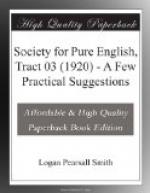II. Alien Plurals.
The useless and pedantic process of de-assimilation takes other forms, one of the most common of which is the restoring their foreign plural forms to words borrowed from Greek, Latin, and Italian. No common noun is genuinely assimilated into our language and made available for the use of the whole community until it has an English plural, and thousands of indispensable words have been thus incorporated. We no longer write of ideae, chori, asyla, musea, sphinges, specimina for ideas, choruses, asylums, museums, sphinxes, specimens, and the notion of returning to such plurals would seem barbarous and absurd. And yet this very process is now going on, and threatens us with deplorable results. Sanatoria, memoranda, gymnasia are now replacing sanatorium, memorandums, and gymnasiums; automata, formulae, and lacunae are taking the place of automatons, formulas, and lacunas; indices and apices of indexes and apexes, miasmata of miasmas or miasms; and even forms like lexica, rhododendra, and chimerae have been recently noted in the writings of authors of repute.
Some of these words are no doubt exceptions. Memoranda is preferable when used collectively, but the English plural is better in such a phrase as ‘two different memorandums’. Automata, too, is sometimes collective; and lacuna always carries the suggestion of its classical meaning, which makes half the meaning of the word. So again, when the classical form is a scientific term, it is convenient and well to preserve its differentiation, e.g. formulae in science, or foci and indices in mathematics; but such uses create exceptions, and these should be recognized as exceptions, to a general rule that wherever there is choice then the English form is to be preferred: we should, for instance, say bandits and not banditti.
III. ae and oe.
The use of ae and oe in English words of classical origin was a pedantic innovation of the sixteenth century: in most words of common use ae and oe have been replaced by the simple e, and we no longer write praevious, aeternal, aera, aemulate, c[oe]lestial, [oe]conomy, &c. Since, however, those forms have a learned appearance, they are being now restored in many words which had been freed from them; medieval is commonly written mediaeval; primaeval and co-aeval are beginning to make their appearance; peony is commonly written paeony, and the forms saecular, chimaera, hyaena[1] and praeternatural




